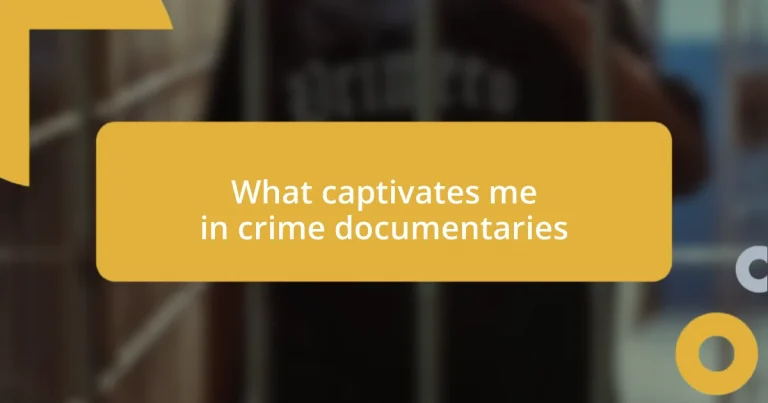Key takeaways:
- Crime documentaries effectively blend sensational storytelling with real-life emotions, stirring empathy and prompting discussions about morality and justice.
- The psychological factors, such as suspense and character empathy, enhance viewers’ engagement and memory retention, making narratives more impactful.
- Ethical considerations in production are vital, as filmmakers must balance storytelling with respect for the subjects’ pain and the community’s sentiments.
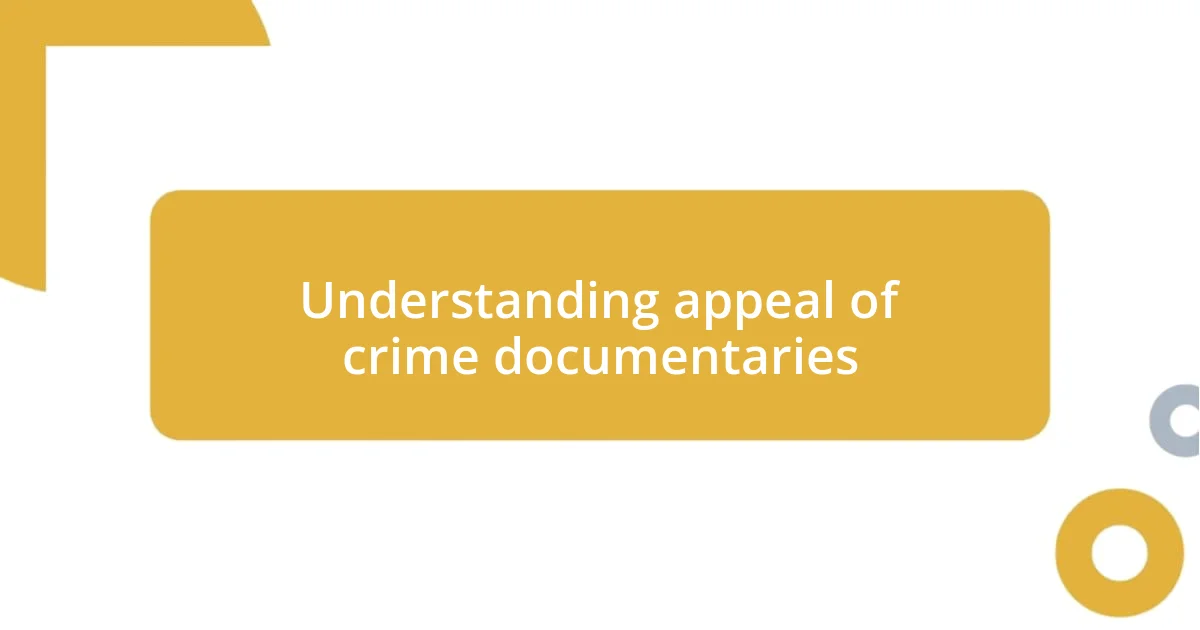
Understanding appeal of crime documentaries
Crime documentaries have an uncanny ability to captivate us, pulling us into the depths of human psychology. I remember binge-watching a particularly gripping series and being struck by the complexity of the criminal mind. It made me wonder—what drives someone to commit such heinous acts? This quest for understanding is a powerful draw for many viewers.
The sensational storytelling, combined with real-life footage and interviews, creates an almost cinematic experience that blurs the lines between fiction and reality. I often find myself emotionally intertwined with the victims’ stories, feeling a deep empathy for their struggles. How could I not? Each narrative exposes profound human truths, sparking conversations about morality, justice, and societal norms.
There’s also the thrill of the investigation itself. I love piecing together the clues, almost like I’m a detective in my own right. Isn’t it fascinating how these documentaries stimulate our critical thinking? Through each twist and turn in the narrative, we engage with the material in a unique way, prompting us to reflect on our own values and the world around us.
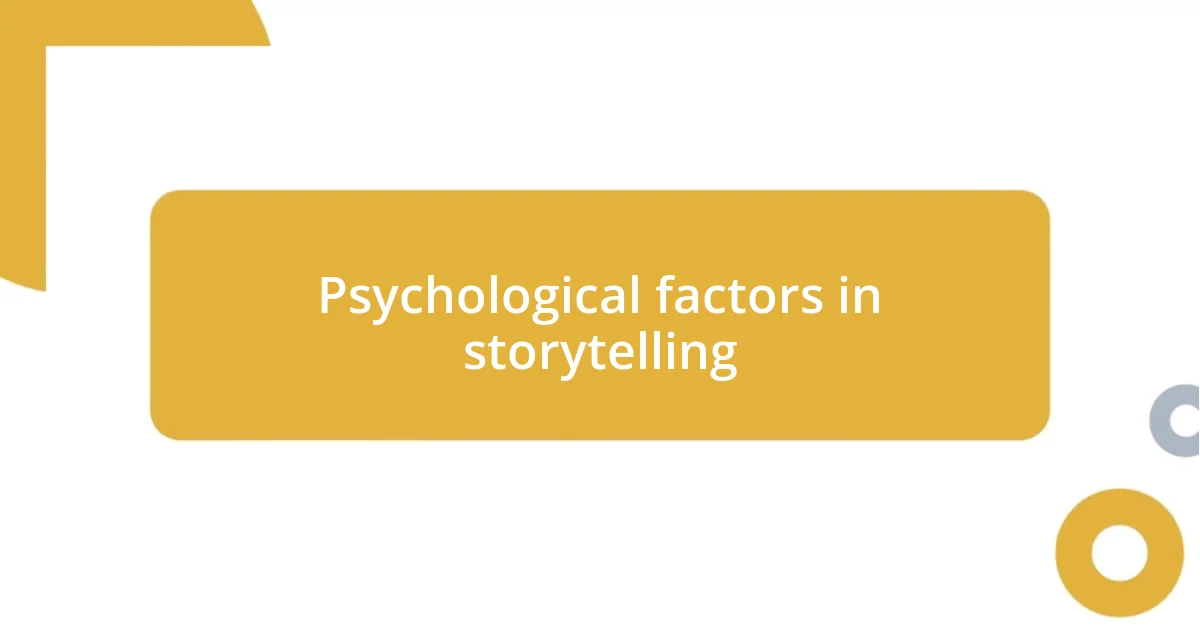
Psychological factors in storytelling
The psychological factors in storytelling play a crucial role in how crime documentaries resonate with us. When I watch these films, I can almost feel the adrenaline rush as the narrative unfolds, gripping my attention completely. The suspense often hinges on our innate curiosity—what happens next? This suspense draws us in, similar to how a cliffhanger in a book keeps us turning the pages late into the night.
Moreover, we connect deeply with the characters, whether they are victims or perpetrators. I recall watching a documentary that featured a murderer reflecting on their past. It was jarring, yet I found myself empathizing with their childhood experiences that led to their twisted choices. This complexity unveils deeper truths about human nature and suggests that our paths can be shaped by circumstances beyond our control. By exploring these characters’ motivations, we mirror our own lives and confront uncomfortable realities.
Emotional arousal through these narratives also affects our memory retention. I can’t help but remember certain scenes vividly, even weeks later. I’ve noticed how the emotional highs and lows create a mnemonic device—tying intense feelings to the storyline. This mechanism gives crime documentaries their staying power, ensuring the messages linger in our minds long after the credits roll.
| Psychological Factor | Impact on Storytelling |
|---|---|
| Suspense | Grips attention and fuels curiosity |
| Character Empathy | Encourages viewers to explore complex emotions |
| Emotional Arousal | Enhances memory retention of narrative elements |
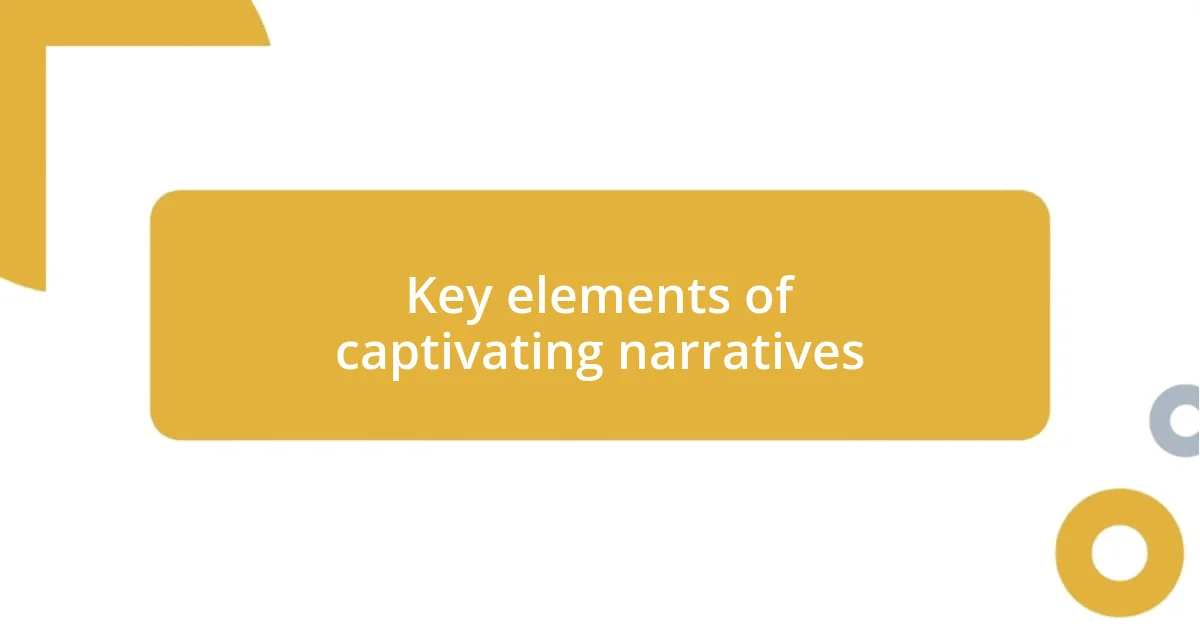
Key elements of captivating narratives
The key elements of captivating narratives in crime documentaries often revolve around deeply engaging story arcs and relatable character emotions. I remember getting drawn into a documentary where the interviewer allowed the subject to recount their experiences at their own pace. That slow unraveling generated an intimacy that felt almost personal. It’s as if I was right there, absorbing every conflicted emotion, which made the story resonate with me on multiple levels.
- Strong Characters: Complex individuals spark empathy and keep viewers invested.
- Unpredictable Twists: Surprising narrative turns maintain suspense and engagement.
- Raw Emotion: Honest storytelling evokes genuine feelings, prompting reflection.
- Cultural Context: Setting the narrative within its societal background adds authenticity.
Every time I watch, I find myself identifying with different characters, examining the motives behind their actions. For instance, in a documentary focused on a troubled youth, I felt a mix of sadness and understanding, recognizing how societal pressures can distort a person’s decisions. It’s this intricate dance between plot and emotions that transforms a simple story into a captivating narrative, keeping viewers like me coming back for more.
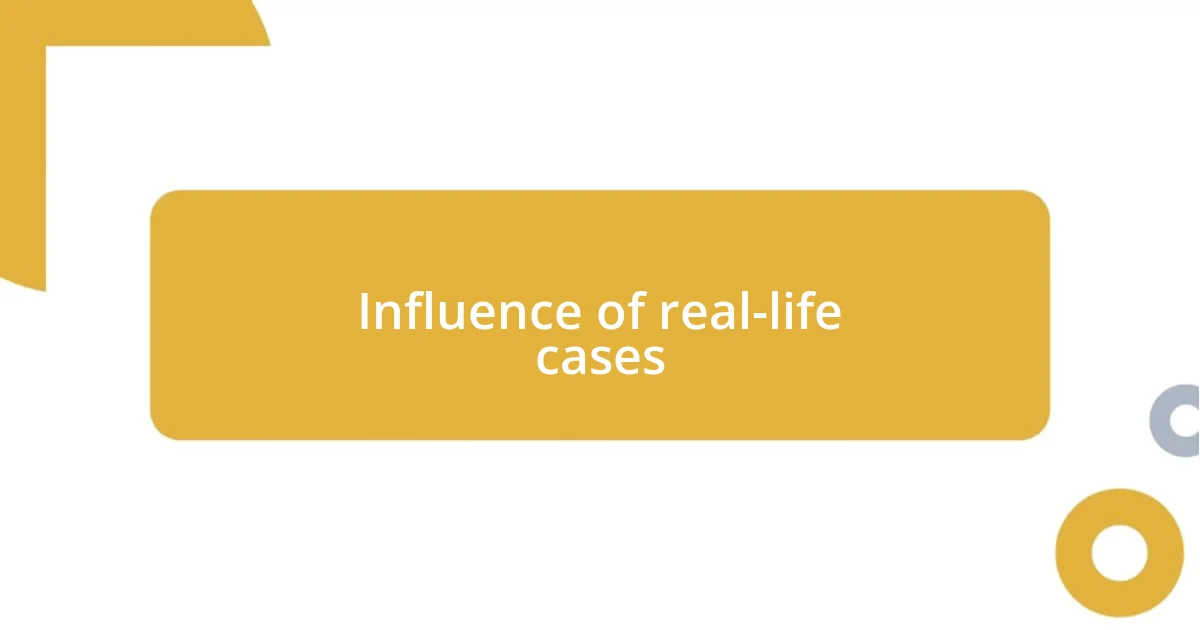
Influence of real-life cases
When I delve into crime documentaries that showcase real-life cases, I often find myself reflecting on the tragic outcomes that these individuals endure. One particular documentary I watched chronicled a notorious unsolved murder. As I processed the details, I couldn’t shake off the feeling of sadness—not just for the victim, but also for the community left in the wake of such violence. How do these events shape people’s lives long after the cameras stop rolling?
These real-life stories resonate deeply because they remind me that true crime is not just a sensationalized story, but a stark reflection of societal issues. I vividly remember a case where a struggling single mother became embroiled in a crime. The documentary painted such a vivid picture of her desperation that I found myself asking, “What would lead someone to that point?” It’s harrowing to realize that circumstances can sometimes push individuals toward paths they never imagined.
Moreover, the way these documentaries humanize the victims and offenders adds a layer of complexity that can’t be ignored. I recall a segment about a family who lost a loved one to a violent act. Their sorrow was palpable, and it struck me that behind every statistic, there’s a story filled with grief and loss. By exposing these real-life consequences, crime documentaries serve as powerful reminders of humanity’s darker sides, but they also invite discussions about empathy and justice.
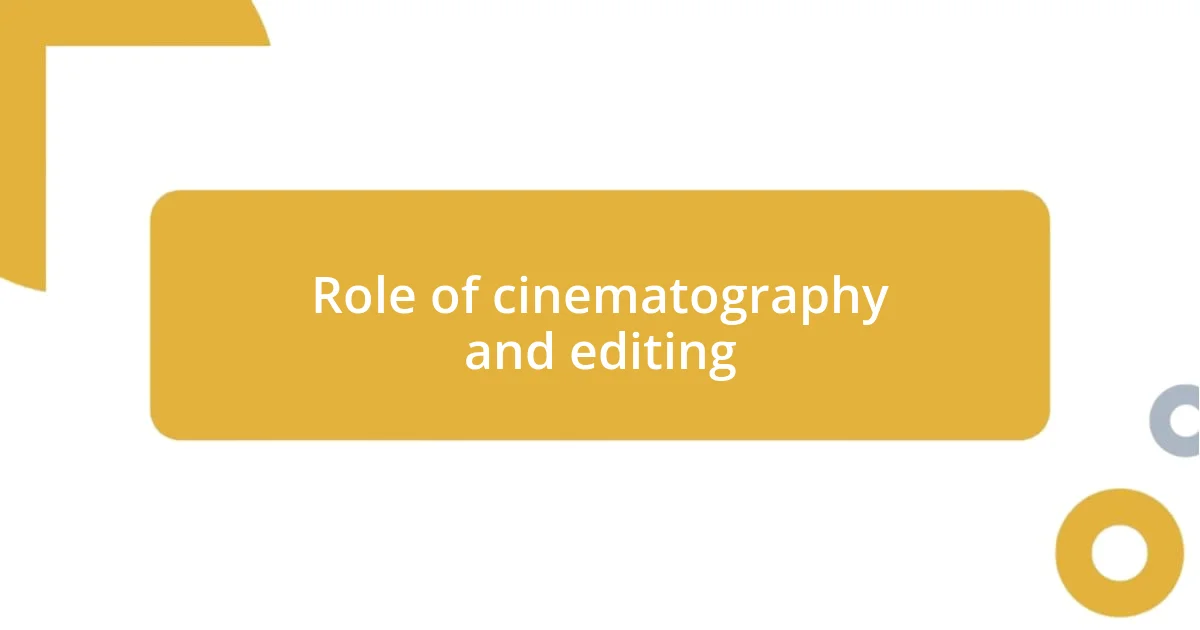
Role of cinematography and editing
When I immerse myself in crime documentaries, the role of cinematography and editing becomes undeniably crucial. I often notice how the camera angles and lighting choices can create a palpable tension that enhances the unfolding narrative. For instance, I recall a moment in a documentary where a close-up shot of an interviewee’s trembling hands spoke volumes about their inner turmoil—no words were necessary. It’s fascinating how visuals can convey emotions that dialogue sometimes fails to express.
Editing, on the other hand, plays a pivotal part in shaping the pacing and flow of the story. I’ve seen how seamless transitions or sudden cuts can heighten suspense and keep viewers on the edge of their seats. There was one documentary that expertly used flashbacks to juxtapose past and present, deepening my understanding of the character’s motivations. Isn’t it remarkable how a well-timed edit can shift our perception and make us reconsider everything we thought we knew?
Moreover, the soundtrack often ties everything together, amplifying the emotional weight of each scene. I vividly remember a chilling score that played during a reenactment, creating an atmosphere where I felt as if I were witnessing the events unfold firsthand. The combination of visuals, editing, and sound is like a carefully orchestrated performance, drawing me in and making each story unforgettable. How powerful is it to realize that these technical elements not only enhance storytelling but also forge a deeper connection with the audience?
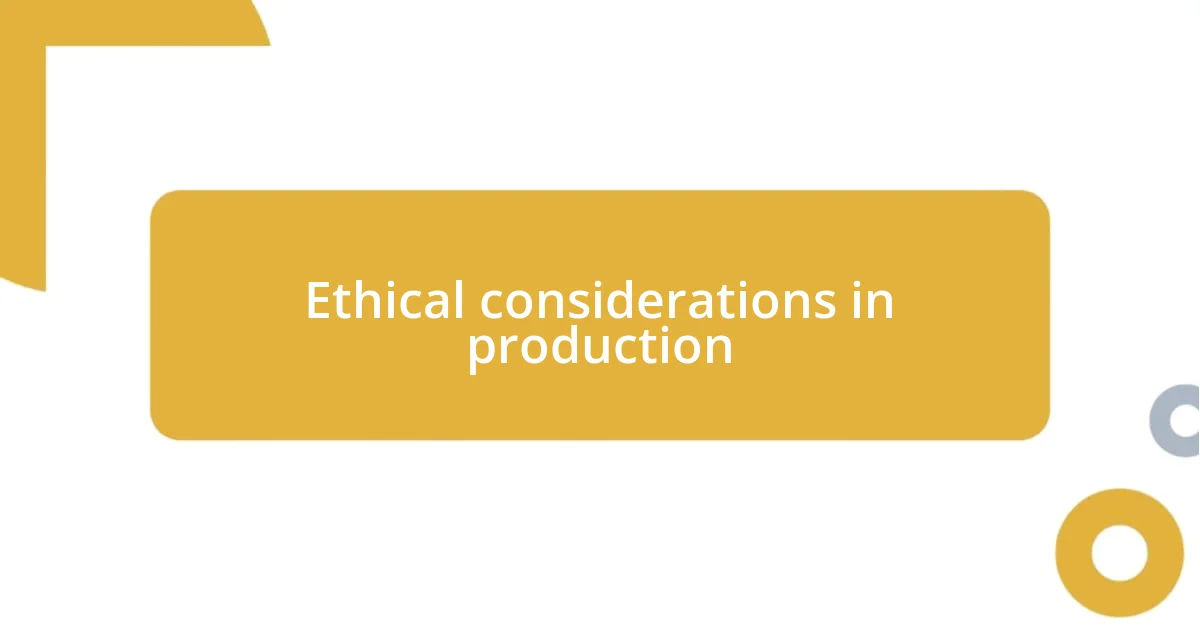
Ethical considerations in production
Navigating the ethical landscape of crime documentary production is a delicate balancing act. I often wonder about the responsibilities filmmakers have toward their subjects and the viewers. For example, when a director decides to sensationalize certain elements of a case, they might inadvertently minimize the real pain experienced by the victims’ families. Is it fair to prioritize entertainment over ethical integrity? This constant tension is something I find myself contemplating whenever I watch, reminding me that there’s a human cost behind the stories.
I’ve also noticed how interviews can cross ethical lines. Filmmakers may push interviewees to share more than they’re comfortable with, creating a situation that feels exploitative rather than informative. One time, I watched a documentary that featured a grieving parent whose raw emotions were laid bare for public consumption. It was powerful, sure, but I couldn’t help but feel uneasy, questioning if capturing that level of vulnerability was truly necessary for the narrative. What does it say about us as viewers if we find compelling stories in the pain of others?
Moreover, consent plays a critical role in ethical production. When documenting sensitive events, the question of who is giving permission becomes paramount. I recall a well-regarded docuseries that faced backlash after exploring a controversial case without fully understanding the community’s sentiments. How can filmmakers ensure they’re representing the truth while honoring the voices affected by these narratives? It’s a reminder that ethical considerations shouldn’t just be an afterthought; they must permeate every facet of production, affecting how stories are told and perceived.
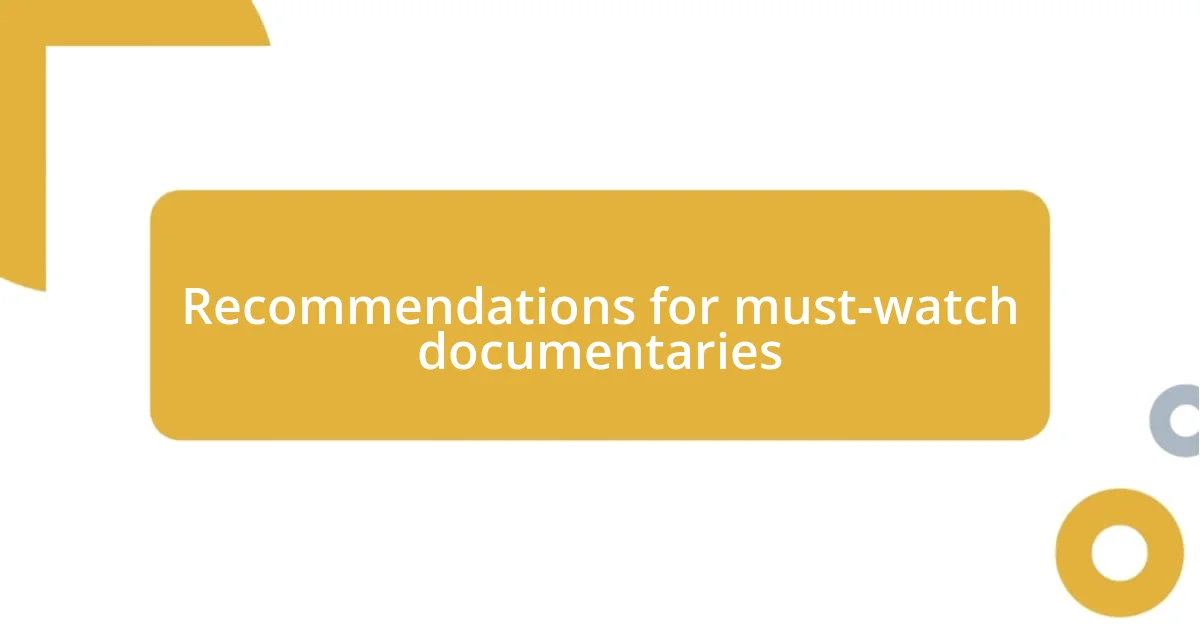
Recommendations for must-watch documentaries
When it comes to must-watch documentaries in the crime genre, I can’t recommend “Making a Murderer” highly enough. It captivated me with its intricate storytelling and complex characters. I often find myself questioning the justice system after watching—it really makes you wonder about the fine line between guilt and innocence. Does anyone truly know the full story?
Another standout is “The Jinx: The Life and Deaths of Robert Durst.” I remember being glued to my screen, anticipating each twist and turn. The way the filmmakers drew connections between Durst’s past and the unfolding narrative had me reflecting on the psychology of criminals. It leaves you pondering: how does one man’s psyche lead to such chilling actions?
Lastly, “Evil Genius” struck a chord with me due to its unexpected twists and the bizarre nature of the events it covers. I was initially skeptical about diving into another heist documentary, but the exploration of human greed and manipulation was shockingly profound. It really made me consider what drives people to commit heinous acts in the name of money. What do we miss about human nature when we only focus on the crime itself?












